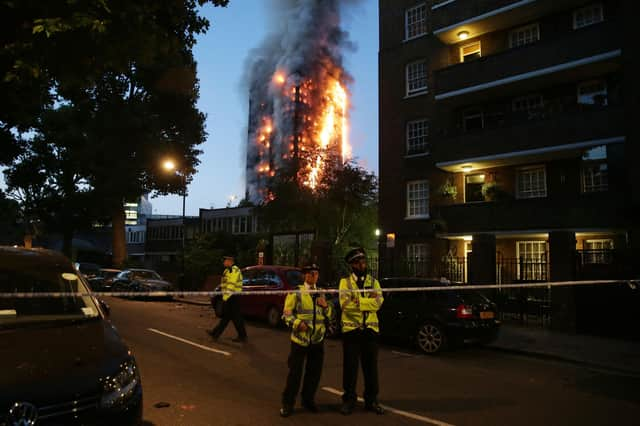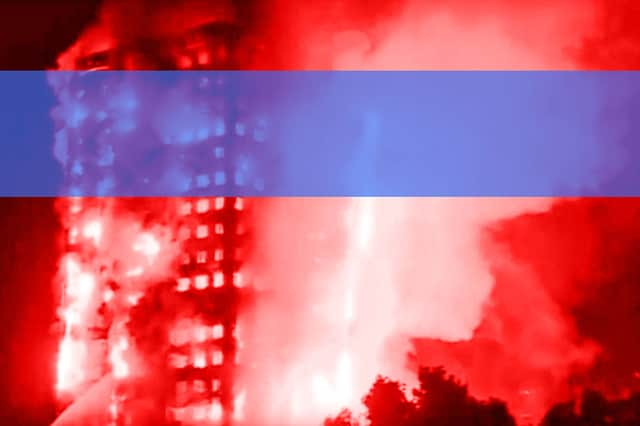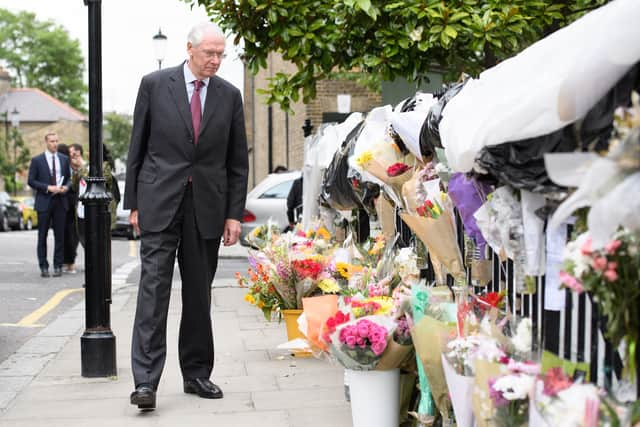Grenfell Tower Testimony Week: what happened in deadly fire which killed 72 people - what has inquiry found?
and live on Freeview channel 276
Bereaved families and survivors of the Grenfell Tower fire will this week get the chance to come face-to-face with those organisations they hold responsible for the disaster.
The blaze at the tower block in west London tragically killed 72 people in June 2017. It also rendered former residents homeless, with all of their possessions destroyed - and both physically and mentally injured the survivors, many of whom endured a terrifying escape from the 24-storey building.
Advertisement
Hide AdAdvertisement
Hide AdGrenfell Testimony Week was agreed following a global settlement of compensation claims in the High Court last year. Organisers of the four-day event said it is being held to give bereaved, survivors and residents an opportunity to “speak directly to representatives from the defendant organisations that many of them hold responsible for the fire”.
No representative from Arconic, which supplied the cladding on the outside of the tower, was able to attend, which the bereaved families said showed not only “a total disregard for their responsibilities but also a total disregard for our loss”.
But what caused the Grenfell Tower fire, what action has been taken since and what did survivors say at the Testimony Week? Here is everything you need to know.


What happened in the Grenfell Tower fire?
Grenfell Tower was a 24-storey brutalist block of flats, which was part of the Lancaster West Estate in North Kensington. It is one of the most deprived parts of the Royal Borough of Kensington and Chelsea, which is the wealthiest local authority in the country.
Advertisement
Hide AdAdvertisement
Hide AdA defective fridge-freezer on the fourth story ignited the fire on 14 June 2017, which quickly crept up the building’s exterior, causing fire and smoke to spread throughout all of the residential floors. The rapid spread of the flames was attributed to the air gap between the building’s cladding and external insulation, and the fire raged for nearly 60 hours until it was ultimately put out.
Efforts to suppress the fire and rescue residents comprised more than 250 London Fire Brigade firefighters and 70 fire engines from stations around the city.
As well as the dangerous and combustible cladding, Grenfell Tower, like many other tower blocks in the UK, was built with a "stay put" policy in mind in the case of a fire. The idea being that if a fire broke out in one apartment, the flames would be contained for long enough for the fire department to arrive and extinguish them.
Only individuals who lived in directly impacted apartments would be expected to leave, and the structure was built with the assumption that a complete evacuation would never be required. However, in the case of Grenfell, the fire spread rapidly across the building due to the flammable cladding and tragically the people who stayed put in their flats died. There were a total of 72 victims, of all ages and nationalities.


What has happened since?
Advertisement
Hide AdAdvertisement
Hide AdThe tragedy felt like a seminal moment in modern British history, and provoked a reckoning on housing safety and austerity. The government banned the Aluminium Composite Material (ACM) cladding from all new buildings, and required its removal from flat blocks over 11 metres tall.
In many cases however, freeholders pushed the costs of this onto the leaseholders leaving many people trapped in dangerous flats they couldn’t sell. In other cases people were forced to pay for the expensive cladding costs, often taking out personal loans to cover the cost of work.
Eventually in 2022, Housing Secretary Michael Gove forced developers and freeholders to agree a plan over removing unsafe cladding on flats, or he would use government powers against them. Potential action included restricting access to government funding and future procurements, the use of planning powers, and pursuing firms through the courts.
People living in buildings under 11m, with dangerous cladding, have also been left stuck. Lisa Petty told NationalWorld she was left with a £30,000 removal bill and trapped in her “flammable” building unable to sell, as the block was under 11m.
Advertisement
Hide AdAdvertisement
Hide AdThe government passed the Fire Safety Act in 2021, which clarified that external walls and flat entrance doors must also be included in a fire risk assessment, and the Building Safety Act in 2022, which strengthened safety for high-rise blocks.
So far, however, it has not taken up the inquiry recommendation to bring in Personal Emergency Evacuation Plans (PEEPs) for disabled people. More than two in five people who died in the fire were disabled.


What has the Grenfell Inquiry found?
The Grenfell Tower Inquiry - led by Sir Martin Moore-Bick - was established in 2018 to uncover what failings led to the tragedy. It opened with tributes to the 72 victims and heard harrowing stories of residents trying to escape the flames.
It was set up in two phases, with phase one focusing on the factual events that occurred on 14 June 2017 and phase two exploring what caused the event and how Grenfell Tower was in the condition which allowed the fire to spread. Phase one’s report was published in October 2019, but families and residents are still waiting to hear the conclusions from phase two, which is due to be published this year.
Advertisement
Hide AdAdvertisement
Hide AdThe most damning finding of the inquiry is that all 72 deaths were avoidable. Richard Millett KC, counsel to the inquiry, told survivors and the bereaved that “each and every one of the risks which eventuated at Grenfell Tower on that night were well known by many and ought to have been known by all”.
“As a result, you will be able to conclude with confidence that each and every one of the deaths that occurred at Grenfell Tower on June 14, 2017, was avoidable,” he said. Millett launched a scathing attack on the companies and organisations involved in the tragedy, saying they had spun a “web of blame” and continued to deny responsibility despite evidence of “incompetence,” “malpractice”, and “dishonesty”.
Phase one of the inquiry ruled that the fire, which started in the fridge of a fourth floor flat “was perfectly foreseeable.” It discovered the cladding that was on the building that was made from an ACM that “acted as a source of fuel” and insulation boards behind the panels that caused the fire to spread. It also called into question the tragic “stay put” advice given to residents in their homes, which then saw them trapped and unable to escape.
The inquiry has no legal powers to prosecute people, that instead falls to another investigation called Operation Northleigh which is being carried out by the Metropolitan Police. The force said it would continue with the probe after the inquiry has published its findings in full.
What was said at Grenfell Testimony Week?
Advertisement
Hide AdAdvertisement
Hide AdAt the testimony week, the aunt of a 12-year-old girl who died in the blaze said Grenfell and other scandals have shown an “attitude of unaccountable power” that exists in companies which have “lost their moral compass”.
Sandra Ruiz called for a change in how organisations are led as she addressed representatives from many of the firms which bereaved and survivors hold responsible for what happened in June 2017.
Representatives from Celotex, Exova, London Fire Brigade, Kingspan, the Royal Borough of Kensington and Chelsea, Rydon, and Whirlpool Corporation all accepted invitations to testimony week, as well as representatives from the Home Office and Ministry of Housing, Communities and Local Government.
Arconic, which supplied the cladding on the outside of the tower, said it has made a “significant financial contribution to fund the organisation” of testimony week but added that it regretted that no representatives could attend.
Advertisement
Hide AdAdvertisement
Hide AdTo those who were present, Ruiz said: “You are sitting here because you formed part of this disaster.” Listening to the testimonies of bereaved and survivors “is the first step in your conciliation process”, she said. But she described the fact that not all defendant organisations were present as showing not only “a total disregard for their responsibilities but also a total disregard for our loss”.
Ralph Blackburn is NationalWorld’s politics editor based in Westminster, where he gets special access to Parliament, MPs and government briefings. If you liked this article you can follow Ralph on X (Twitter) here and sign up to his free weekly newsletter Politics Uncovered, which brings you the latest analysis and gossip from Westminster every Sunday morning.
